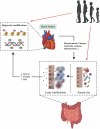The role of the gut microbiota in the onset and progression of heart failure: insights into epigenetic mechanisms and aging
- PMID: 39614396
- PMCID: PMC11607950
- DOI: 10.1186/s13148-024-01786-9
The role of the gut microbiota in the onset and progression of heart failure: insights into epigenetic mechanisms and aging
Abstract
Background: The gut microbiota (GM) plays a critical role in regulating human physiology, with dysbiosis linked to various diseases, including heart failure (HF). HF is a complex syndrome with a significant global health impact, as its incidence doubles with each decade of life, and its prevalence peaks in individuals over 80 years. A bidirectional interaction exists between GM and HF, where alterations in gut health can worsen the disease's progression.
Main body: The "gut hypothesis of HF" suggests that HF-induced changes, such as reduced intestinal perfusion and altered gut motility, negatively impact GM composition, leading to increased intestinal permeability, the release of GM-derived metabolites into the bloodstream, and systemic inflammation. This process creates a vicious cycle that further deteriorates heart function. GM-derived metabolites, including trimethylamine N-oxide (TMAO), short-chain fatty acids (SCFAs), and secondary bile acids (BAs), can influence gene expression through epigenetic mechanisms, such as DNA methylation and histone modifications. These epigenetic changes may play a crucial role in mediating the effects of dysbiotic gut microbial metabolites, linking them to altered cardiac health and contributing to the progression of HF. This process is particularly relevant in older individuals, as the aging process itself has been associated with both dysbiosis and cumulative epigenetic alterations, intensifying the interplay between GM, epigenetic changes, and HF, and further increasing the risk of HF in the elderly.
Conclusion: Despite the growing body of evidence, the complex interplay between GM, epigenetic modifications, and HF remains poorly understood. The dynamic nature of epigenetics and GM, shaped by various factors such as age, diet, and lifestyle, presents significant challenges in elucidating the precise mechanisms underlying this complex relationship. Future research should prioritize innovative approaches to overcome these limitations. By identifying specific metabolite-induced epigenetic modifications and modulating the composition and function of GM, novel and personalized therapeutic strategies for the prevention and/or treatment of HF can be developed. Moreover, targeted research focusing specifically on older individuals is crucial for understanding the intricate connections between GM, epigenetics, and HF during aging.
Keywords: Aging; Dysbiosis; Epigenetic changes; Gut microbiome; Heart failure.
© 2024. The Author(s).
Conflict of interest statement
Declarations. Ethics approval and consent to participate: Not applicable. Consent for publication: Not applicable. Competing interests: The authors declare no competing interests.
Figures

References
-
- Li D, et al. The gut microbiota: a treasure for human health. Biotechnol Adv. 2016;34(7):1210–24. - PubMed
Publication types
MeSH terms
Substances
LinkOut - more resources
Full Text Sources
Medical
Research Materials
Miscellaneous

